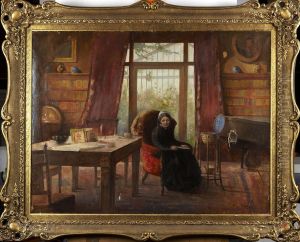Rodolphe Christen Paintings
Rodolphe Christen was a Swiss painter known for his landscape and portrait works, born in 1866 in Basel, Switzerland. His artistic journey began in his hometown, where he was initially trained. He later expanded his education by moving to Munich, Germany, which was a significant center for art training during the late 19th century. There, he was influenced by the academic painting traditions of the time, which is reflected in the classical approach to his subjects and his meticulous attention to detail.
Christen's works often depicted the Swiss countryside, capturing the serene and picturesque qualities of his native landscapes. His ability to render light and atmosphere in his paintings was notable and lent a sense of realism and tranquility to his works. In addition to landscapes, Christen was also proficient in portraiture, where his ability to capture the character and essence of his subjects won him accolades. His portraits are characterized by a strong sense of realism, combined with a subtle sensitivity to the personalities of his sitters.
Throughout his career, Rodolphe Christen exhibited his works in various venues, including art exhibitions in Switzerland and abroad. His paintings were well-received, and he garnered a respectable following among art collectors and enthusiasts of the era. Despite the changing tides of artistic trends, including the rise of modernism, Christen remained dedicated to his classical style, which continued to appeal to a segment of the art market that favored traditional aesthetics.
Rodolphe Christen's legacy is that of a skilled painter who contributed to the Swiss art scene through his dedication to capturing the essence of his homeland and its people. His works remain a testament to the academic art traditions of the late 19th and early 20th centuries, reflecting the technical proficiency and aesthetic values of that period. Christen passed away in 1946, leaving behind a body of work that continues to be appreciated for its beauty and craftsmanship.
